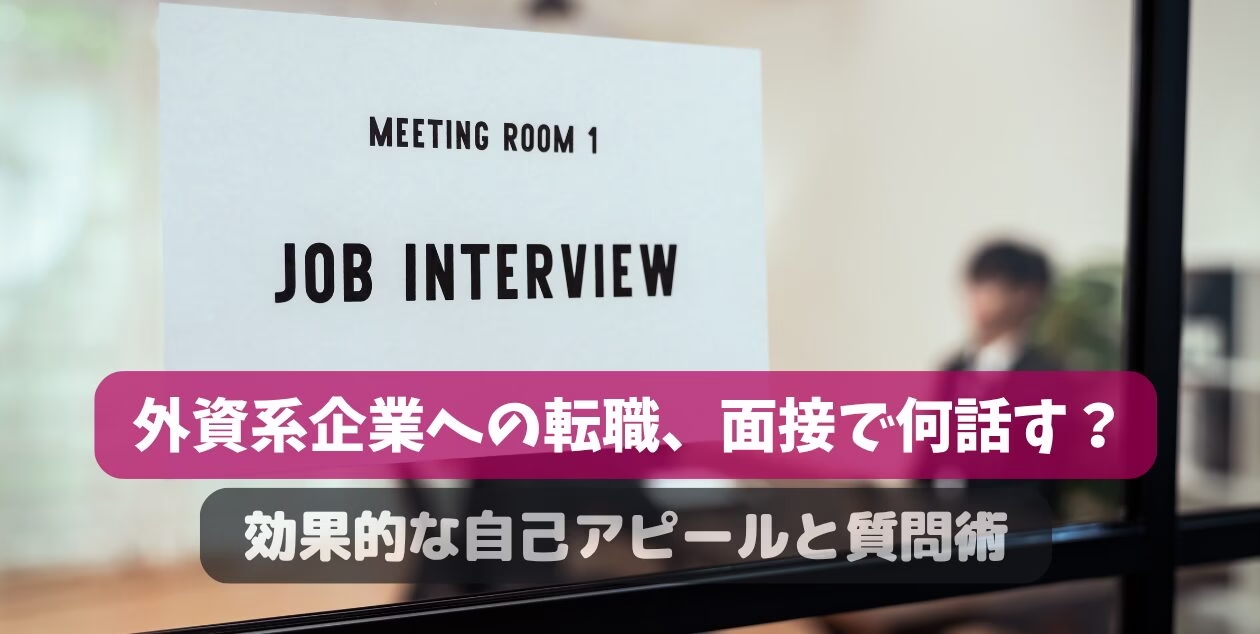外資系企業への転職は、あなたのキャリアを大きく変えるチャンスです。しかし、面接で成功するには、ただ英語ができるだけでは不十分。グローバルなビジネス環境で求められる「企業文化」への深い理解と、「自己表現力」、そして徹底した「準備」が不可欠です。
「面接対策は何から始めればいい?」「日本人が陥りがちな失敗は?」といった不安を抱えていませんか?この記事では、外資系転職を成功させるために不可欠な面接のコツを、具体的な対策法とともにご紹介します。本ガイドを参考に、内定を勝ち取るための自信とスキルを手に入れましょう。
履歴書・応募書類で使える基本フレーズ

応募の意思を表明する
I am writing to apply for the position of ~
- 発音: /aɪ əm ˈraɪtɪŋ tuː əˈplaɪ fɔr ðə pəˈzɪʃ(ə)n əv/
- 意味: ~の職に応募いたします
- 解説: 履歴書・カバーレターの冒頭で使用する定型表現です。フォーマルで丁寧な印象を与えます。
- 例文: I am writing to apply for the position of Marketing Specialist at your company.
- 和訳: 貴社のマーケティングスペシャリスト職に応募いたします。
書類の添付を伝える
Please find my attached resume.
- 発音: /pliːz faɪnd maɪ əˈtætʃt ˈrɛzjʊmeɪ/
- 意味: 履歴書を添付いたします
- 解説: メールで履歴書等を送る際の定番表現です。ビジネスメールでよく使われます。
- 例文: Please find my attached resume for your review.
- 和訳: ご査収のほど、添付の履歴書をご覧ください。
推薦者について
References available upon request.
- 発音: /ˈrɛfrənsɪz əˈveɪləbl əˈpɒn rɪˈkwɛst/
- 意味: ご要望があれば推薦者をご紹介します
- 解説: 履歴書の末尾等で、推薦状は必要に応じて用意可能という意思表明に使います。
- 例文: References available upon request.
- 和訳: ご要望があれば推薦者を紹介いたします。
面接の可能性を伝える
I am available for an interview at your earliest convenience.
- 発音: /aɪ əm əˈveɪləbl fɔːr ən ˈɪntərvjuː æt jɔːr ˈɜːrliɪst kənˈviːniəns/
- 意味: ご都合の良い時に面接可能です
- 解説: 書類選考通過後、面接日程調整時に使用します。柔軟性をアピールできます。
- 例文: I am available for an interview at your earliest convenience.
- 和訳: ご都合のよいときに面接を受けることができます。
面接で自分をアピールする表現

経歴・背景の紹介
I have a background in ~
- 発音: /aɪ hæv ə ˈbækˌɡraʊnd ɪn/
- 意味: ~の経歴/経験がある
- 解説: 自分の職務経験やスキルの分野を紹介する際の基本表現です。
- 例文: I have a background in financial analysis and project management.
- 和訳: 財務分析とプロジェクト管理の経歴があります。
I have extensive/significant experience in ~
- 発音: /aɪ hæv ɪkˈstɛnsɪv/sɪɡˈnɪfɪkənt ɪkˈspɪəriəns ɪn/
- 意味: ~での幅広い/豊富な経験がある
- 解説: 「a lot of」よりもフォーマルで説得力があります。履歴書にも最適です。
- 例文: I have significant experience in international sales.
- 和訳: 国際営業において豊富な経験があります。
意欲・モチベーションの表現
I am highly motivated to ~
- 発音: /aɪ əm ˈhaɪli ˈmoʊtɪˌveɪtɪd tuː/
- 意味: ~に非常に意欲がある
- 解説: その仕事への熱意や目的意識を伝える際に効果的です。
- 例文: I am highly motivated to contribute to your company’s success.
- 和訳: 御社の成功に貢献したいという強い意欲があります。
I am eager to contribute to your team.
- 発音: /aɪ əm ˈiːɡər tuː kənˈtrɪbjuːt tuː jɔːr tiːm/
- 意味: ぜひ貴社チームに貢献したい
- 解説: 志望動機や意欲をアピールする際に有効な表現です。
- 例文: I am eager to contribute to your team’s future success.
- 和訳: 貴社チームの今後の成功に貢献したいと考えています。
転職理由の説明
I am looking for an opportunity to ~
- 発音: /aɪ əm ˈlʊkɪŋ fɔːr ən ˌɑːpəˈtuːnɪti tuː/
- 意味: ~の機会を探しています
- 解説: キャリアアップ志望や転職理由の説明に使える前向きな表現です。
- 例文: I am looking for an opportunity to develop my leadership skills.
- 和訳: リーダーシップスキルを伸ばす機会を求めています。
職務経験を効果的に伝えるフレーズ

責任・担当業務の説明
I was responsible for ~ing
- 発音: /aɪ wəz rɪˈspɑːnsəbl fɔːr/
- 意味: ~を担当していました
- 解説: 前職での役割や業務内容を述べるときの必須フレーズです。
- 例文: I was responsible for managing a team of 15 members.
- 和訳: 15名のチームの管理を担当していました。
My previous role involved ~ing
- 発音: /maɪ ˈpriːviəs roʊl ɪnˈvɑːlvd/
- 意味: 前職では~していました
- 解説: 前の仕事での経験をスマートに紹介できる表現です。
- 例文: My previous role involved coordinating international projects.
- 和訳: 前職では国際プロジェクトの調整をしていました。
具体的な業務内容
Managed customer accounts and handled client communications.
- 意味: 顧客アカウントを管理し、クライアントとのコミュニケーションを担当した。
- 解説: 営業やカスタマーサービス系の役割で使える表現です。
- 例文: I managed customer accounts and handled client communications efficiently.
- 和訳: 私は顧客アカウントを管理し、効果的にクライアントとのコミュニケーションを行いました。
Coordinated project schedules and ensured timely delivery.
- 意味: プロジェクトのスケジュールを調整し、納期を守った。
- 解説: プロジェクト管理などで使用される実務的な表現です。
- 例文: I coordinated project schedules to ensure timely delivery of all milestones.
- 和訳: 私は全てのマイルストーンを予定通り納品するためにスケジュール調整を行いました。
Prepared detailed reports and presented findings to management.
- 意味: 詳細なレポートを作成し、経営陣に報告した。
- 解説: 分析・企画・管理系職種での定番表現です。
- 例文: I prepared detailed reports and presented the findings during weekly meetings.
- 和訳: 私は詳細なレポートを作成し、週次ミーティングで報告しました。
Supervised and trained new employees.
- 意味: 新入社員の指導と管理を行った。
- 解説: マネジメントや教育系業務に対応する表現です。
- 例文: I supervised and trained new employees to ensure high performance.
- 和訳: 私は新入社員を指導し、高いパフォーマンスを維持させました。
Developed and implemented marketing strategies.
- 意味: マーケティング戦略を立案し実行した。
- 解説: マーケティング・商品企画系の職種でアピールできる表現です。
- 例文: I developed and implemented marketing strategies that increased sales by 15%.
- 和訳: 私は売上を15%増加させるマーケティング戦略を立案し実行しました。
Handled customer complaints and resolved issues promptly.
- 意味: 顧客からの苦情を対応し、迅速に問題を解決した。
- 解説: サービス・サポート系職種や営業の履歴書に最適です。
- 例文: I handled customer complaints and resolved issues promptly to maintain satisfaction.
- 和訳: 私は顧客からの苦情に対応し、満足度を維持するため迅速に問題を解決しました。
Conducted market research and analyzed industry trends.
- 意味: 市場調査を実施し業界動向を分析した。
- 解説: 企画・マーケティング職におすすめの表現です。
- 例文: I conducted market research and analyzed industry trends to inform business strategies.
- 和訳: 私は市場調査を実施し、事業戦略のために業界動向を分析しました。
Maintained inventory and managed supply chains.
- 意味: 在庫管理とサプライチェーンを管理した。
- 解説: 物流や事務職などでも使用できる表現です。
- 例文: I maintained inventory levels and managed supply chains efficiently.
- 和訳: 私は在庫の適正管理とサプライチェーンの効率的な運営を担当しました。
Collaborated with cross-functional teams to achieve goals.
- 意味: 多部署と連携して目標を達成した。
- 解説: チームワークやプロジェクト型業務の実績をアピールできます。
- 例文: I collaborated with cross-functional teams to successfully launch new products.
- 和訳: 私は多部署と連携し、新製品の発売を成功させました。
Monitored and reported on performance metrics.
- 意味: 業績指標を監視し報告した。
- 解説: 分析や管理職など、業績数値管理を示せる表現です。
- 例文: I monitored and reported on key performance metrics to senior management.
- 和訳: 私は主要業績指標を監視し、上層部に報告しました。
スキル・能力を表現する英語

基本的なスキル表現
My strengths include ~
- 発音: /maɪ streŋkθs ɪnˈkluːd/
- 意味: 私の強みは~です
- 解説: 面接で自分の長所を述べるときによく使われる表現です。
- 例文: My strengths include problem-solving and effective communication.
- 和訳: 私の強みは問題解決力と効果的なコミュニケーションです。
I excel at ~ing
- 発音: /aɪ ɪkˈsɛl æt/
- 意味: ~が得意です
- 解説: 自信を持って自分のスキルをアピールする表現です。
- 例文: I excel at building strong client relationships.
- 和訳: 顧客との良好な関係構築が得意です。
重要なビジネススキル
Communication skills
- 発音: /kəˌmjuːnɪˈkeɪʃən skɪlz/
- 意味: コミュニケーション能力
- 解説: 口頭・書面で分かりやすく伝え、協調的にやり取りできる力。あらゆる職種で重視されるスキルです。
- 例文: I have excellent communication skills, which help me build strong relationships with clients and colleagues.
- 和訳: 私は優れたコミュニケーション能力があり、クライアントや同僚と強い信頼関係を築いています。
Teamwork
- 発音: /ˈtiːmwɜːrk/
- 意味: チームワーク
- 解説: 多様な人と協力し合い、共通の目標に向かって進める力です。
- 例文: I enjoy working in teams and believe that collaboration leads to better results.
- 和訳: チームで働くことが好きで、協力することでより良い成果につながると考えています。
Problem-solving
- 発音: /ˈprɒbləm ˈsɒlvɪŋ/
- 意味: 問題解決力
- 解説: 課題やトラブルに対して分析し、解決策を見つけるスキル。面接でのエピソードとして使われやすいです。
- 例文: I am skilled at problem-solving and enjoy finding creative solutions to difficult challenges.
- 和訳: 私は問題解決が得意で、困難な課題にも創造的な解決策を見つけることを楽しんでいます。
Adaptability
- 発音: /əˌdæptəˈbɪləti/
- 意味: 適応力
- 解説: 変化や新しい状況に柔軟に対応できる力。現代の職場で非常に求められるスキルです。
- 例文: I have strong adaptability and can quickly adjust to new environments or changes in the workplace.
- 和訳: 私は高い適応力があり、新しい環境や変化にもすぐに対応できます。
Time management
- 発音: /taɪm ˈmænɪdʒmənt/
- 意味: 時間管理能力
- 解説: 納期やスケジュール、優先順位を守って効率的に業務を進める能力です。
- 例文: My time management skills allow me to meet deadlines efficiently.
- 和訳: 私の時間管理能力によって、効率的に期限を守ることができます。
Attention to detail
- 発音: /əˈtɛnʃən tuː dɪˈteɪl/
- 意味: 細部への注意力
- 解説: ミスを防ぎ、正確な仕事を行うための重要なスキルです。
- 例文: I always double-check my work to ensure accuracy, showing great attention to detail.
- 和訳: 正確性を保つために必ず自分の仕事を見直し、細部にまで注意を払っています。
Leadership
- 発音: /ˈliːdərʃɪp/
- 意味: リーダーシップ
- 解説: チームを率い、他者に良い影響を与える能力。中級者は小規模プロジェクトのリーダー経験もアピール可能です。
- 例文: I developed leadership skills by managing small project teams and motivating my colleagues.
- 和訳: 小規模なプロジェクトチームを率いて同僚をやる気にさせる中で、リーダーシップを養いました。
Initiative
- 発音: /ɪˈnɪʃətɪv/
- 意味: 自主性・積極性
- 解説: 新しい提案をしたり、指示を待たずに自ら行動できる姿勢です。
- 例文: I always show initiative by seeking out new tasks and proposing improvements.
- 和訳: 自分から積極的に新たな仕事や改善案を提案しています。
Organization
- 発音: /ˌɔːrɡənaɪˈzeɪʃən/
- 意味: 整理能力・管理能力
- 解説: 仕事や資料、情報などを計画的に整える力です。
- 例文: I am highly organized and can keep multiple projects running smoothly.
- 和訳: 私は非常に整理上手で、複数のプロジェクトも円滑に進められます。
Work ethic
- 発音: /wɜːrk ˈɛθɪk/
- 意味: 勤勉さ・責任感
- 解説: 高いモラルと責任を持って仕事に取り組む姿勢です。
- 例文: I have a strong work ethic and always strive to exceed expectations.
- 和訳: 私は強い責任感を持ち、常に期待以上の成果を出そうと努力しています。
Creativity
- 発音: /ˌkriːeɪˈtɪvɪti/
- 意味: 創造力
- 解説: 新しいアイデアを考えたり、従来にない解決策を生み出す力です。
- 例文: My creativity helps me find innovative ways to solve problems.
- 和訳: 私の創造力は、課題解決に革新的な方法をもたらします。
長所・短所を語る際の表現

長所の表現
One of my strengths is my attention to detail.
- 意味: 私の強みの一つは細部への注意力です。
- 例文: One of my strengths is my attention to detail, which helps me avoid costly mistakes.
- 和訳: 私の強みの一つは細部に気を配ることで、コストのかかるミスを防ぐことができます。
I am a quick learner and adapt easily to new environments.
- 意味: 私は新しい環境に迅速に適応し覚えるのが早いです。
- 例文: I am a quick learner and adapt easily to new environments, which allows me to start contributing right away.
- 和訳: 私は新しい環境に迅速に適応し覚えるのが早いため、すぐに貢献を始められます。
I have strong problem-solving skills.
- 意味: 私は強い問題解決能力を持っています。
- 例文: I have strong problem-solving skills, which help me handle complex situations effectively.
- 和訳: 私は複雑な状況を効果的に対処する強い問題解決能力を持っています。
短所の表現(改善への意識も含める)
Sometimes I am too detail-oriented, which can slow me down.
- 意味: 時々、細かいところにこだわりすぎてしまい作業が遅くなることがあります。
- 例文: Sometimes I am too detail-oriented, which can slow me down, but I’m working on balancing speed and accuracy.
- 和訳: 時々細かい点にこだわりすぎて作業が遅くなりますが、スピードと正確さのバランスを取るように努めています。
I sometimes struggle with public speaking.
- 意味: 時々、人前で話すことに苦手意識があります。
- 例文: I sometimes struggle with public speaking, but I have been taking workshops to improve.
- 和訳: 時々人前で話すのが苦手ですが、上達のためにワークショップに参加しています。
I can be impatient when projects take longer than expected.
- 意味: プロジェクトが予想より長引くと、いらいらしてしまうことがあります。
- 例文: I can be impatient when projects take longer than expected, but I am learning to stay calm and patient.
- 和訳: プロジェクトが長引くときにいらいらすることがありますが、冷静さと忍耐力を身につけるよう努めています。
面接での質問・確認フレーズ

仕事内容についての質問
Could you please tell me more about ~?
- 発音: /kʊd juː pliːz tɛl miː mɔːr əˈbaʊt/
- 意味: ~についてもっと詳しく教えていただけますか?
- 解説: 面接で仕事内容や会社・待遇を質問する際の丁寧な表現です。
- 例文: Could you please tell me more about the training opportunities at your company?
- 和訳: 御社の研修制度について、詳しく教えていただけますか?
選考プロセスの確認
What are the next steps in the hiring process?
- 発音: /wʌt ɑːr ðə nɛkst stɛps ɪn ðə ˈhaɪərɪŋ ˈprəʊˌsɛs/
- 意味: 今後の選考プロセスについて教えてください
- 解説: 面接の終盤に流れや今後を確認する定番フレーズです。
- 例文: What are the next steps in the hiring process?
- 和訳: 今後の選考プロセスについて教えていただけますか?
実際の面接会話例

以下は転職エージェントと転職希望者の実際の会話例です。これまでに紹介したフレーズがどのように使われているかご確認ください。
転職エージェントとの会話
Agent: Thank you for coming in today. Could you please start by telling me about your background?
Job Seeker: Thank you for having me. I have a background in financial analysis and project management. My previous role involved coordinating international projects.
Agent: That’s great. What would you say are your main strengths?
Job Seeker: My strengths include problem-solving and effective communication. For example, I excel at building strong client relationships and resolving issues efficiently.
Agent: Excellent. And what is an area where you feel you could improve?
Job Seeker: Sometimes I am too detail-oriented, which can slow me down, but I’m working on balancing speed and accuracy.
Agent: Good self-awareness. Why are you looking for a new position?
Job Seeker: I am looking for an opportunity to develop my leadership skills. I am highly motivated to contribute to your company’s success.
Agent: What kind of roles are you interested in now?
Job Seeker: Ideally, I would like a position where I can use my experience and continue to grow. I am eager to contribute to your team’s future success.
Agent: Could you please send me your resume?
Job Seeker: Of course. Please find my attached resume for your review. References are available upon request.
Agent: Thank you. Do you have any questions for me about the hiring process or the companies I work with?
Job Seeker: Could you please tell me more about the training opportunities at your company? Also, what are the next steps in the hiring process?
Agent: I’ll be happy to explain the details and support you through each stage. I am available for an interview at your earliest convenience if there are any suitable openings.
エージェント:本日はご来社いただきありがとうございます。まずご経歴についてお話しいただけますか?
転職希望者:ご招待いただきありがとうございます。私は財務分析とプロジェクト管理の経歴があります。前職では国際プロジェクトの調整をしていました。
エージェント:素晴らしいですね。あなたの主な強みは何だと思われますか?
転職希望者:私の強みは問題解決力と効果的なコミュニケーションです。たとえば、顧客との良好な関係構築が得意で、効率的に問題を解決しています。
エージェント:素晴らしいです。改善したい点はありますか?
転職希望者:時々細かい点にこだわりすぎて作業が遅くなりますが、スピードと正確さのバランスを取るように努めています。
エージェント:自己認識がしっかりされていますね。なぜ転職を希望されているのですか?
転職希望者:リーダーシップスキルを伸ばす機会を求めています。御社の成功に貢献したいという強い意欲があります。
エージェント:今後はどのようなお仕事を希望されていますか?
転職希望者:できれば自分の経験を活かし、さらに成長できるポジションが理想です。貴社チームの今後の成功に貢献したいと考えています。
エージェント:履歴書をお送りいただけますか?
転職希望者:もちろんです。ご査収のほど、添付の履歴書をご覧ください。ご要望があれば推薦者を紹介いたします。
エージェント:ありがとうございます。採用プロセスやご紹介先について何かご質問はありますか?
転職希望者:御社の研修制度について、詳しく教えていただけますか?また、今後の選考プロセスについても教えていただけますか?
エージェント:詳細についてご説明し、各段階でサポートいたします。もし適任の求人があれば、ご都合のよいときに面接を受けることができますのでご案内します。
転職エージェントによる指導
Coach: Hi, thanks for coming in today. I noticed you seemed a little hesitant when talking about your achievements during our mock interview.
Job Seeker: Yes, I find it hard to talk about myself. I’m not sure what to say.
Coach: That’s a common challenge. Let’s use some of these helpful phrases to structure your answers. For example, when you speak about your experience, you can say, “I have a background in financial analysis and project management.”
Job Seeker: That sounds clear. But what about talking about my responsibilities?
Coach: You could use something like, “I was responsible for managing a team of 15 members,” or “My previous role involved coordinating international projects.” Be specific and confident, and back up your statements with examples.
Job Seeker: What if they ask about my strengths?
Coach: Try saying, “My strengths include problem-solving and effective communication,” or “I excel at building strong client relationships.” The key is to highlight skills that are relevant to the job.
Job Seeker: Should I also mention areas for improvement?
Coach: Yes — that shows honesty and self-awareness. For example, you could say, “Sometimes I am too detail-oriented, which can slow me down, but I’m working on balancing speed and accuracy.”
Job Seeker: I see. How can I express my enthusiasm?
Coach: That’s important too. You might say, “I am highly motivated to contribute to your company’s success” or “I am eager to contribute to your team’s future success.” Expressing genuine motivation always leaves a good impression.
Job Seeker: And what if I have questions for the interviewer?
Coach: It’s good to prepare a couple of questions in advance. You can say, “Could you please tell me more about the training opportunities at your company?” or “What are the next steps in the hiring process?”
Job Seeker: Thank you. This makes me feel much more prepared.
Coach: Remember, practice is key. Use these expressions when rehearsing your answers. With practice, your self-presentation will improve. And don’t forget to bring a copy of your resume and be ready to say, “Please find my attached resume. References available upon request.”
コーチ:こんにちは、本日はありがとうございます。模擬面接を通して、実績を話す際に少し自信がなさそうに見えましたね。
転職希望者:はい、自分のことを話すのは苦手です。何を言えばいいのかわかりません。
コーチ:それはよくある課題です。役立つフレーズを使って答えを組み立てましょう。たとえば経験については、「私は財務分析とプロジェクト管理の経歴があります」と言えます。
転職希望者:分かりやすいですね。でも、担当していた業務はどう言えばいいでしょうか?
コーチ:「15名のチームの管理を担当していました」や「前職では国際プロジェクトの調整をしていました」なども使えます。具体的に自信を持って伝え、実例を添えてください。
転職希望者:自分の強みを聞かれたら?
コーチ:「私の強みは問題解決力と効果的なコミュニケーションです」や「顧客との良好な関係構築が得意です」を使いましょう。応募先に合ったスキルを強調するのが大切です。
転職希望者:弱点も言った方がいいですか?
コーチ:はい、それは誠実さと自己改善意識を示します。例えば、「時々細かい点にこだわりすぎて作業が遅くなりますが、スピードと正確さのバランスを取るように努めています」のように答えましょう。
転職希望者:分かりました。熱意はどう表現したらいいですか?
コーチ:これも重要です。「御社の成功に貢献したいという強い意欲があります」や「貴社チームの今後の成功に貢献したいと考えています」などを使うと良いでしょう。本気度が伝わります。
転職希望者:面接官に質問してよいのでしょうか?
コーチ:事前にいくつか準備しておくと印象が良いです。「御社の研修制度について、詳しく教えていただけますか?」や「今後の選考プロセスについて教えていただけますか?」を使えます。
転職希望者:ありがとうございます。これで自信がつきました。
コーチ:練習こそが大切です。これらの表現を使って答えをリハーサルしてください。慣れれば自己アピールも上手になります。それから、履歴書を忘れずに持参し、「ご査収のほど、添付の履歴書をご覧ください。ご要望があれば推薦者を紹介いたします」と伝えましょう。
面接の会話例
Interviewer: Good morning. Thank you for coming in today. Could you please tell me about yourself?
Applicant: Good morning. Thank you for the opportunity. I have a background in financial analysis and project management. My previous role involved coordinating international projects and managing a team of 15 members.
Interviewer: That’s impressive. My next question is: what are your strengths?
Applicant: My strengths include problem-solving and effective communication. I excel at building strong client relationships and adapting quickly to new environments.
Interviewer: Very good. Can you share an area where you feel you could improve?
Applicant: Sometimes I am too detail-oriented, which can slow me down, but I’m working on balancing speed and accuracy.
Interviewer: Thanks for your honesty. Why do you want to work here?
Applicant: I am looking for an opportunity to develop my leadership skills and I am highly motivated to contribute to your company’s success.
Interviewer: Excellent. What can you bring to our team?
Applicant: I am eager to contribute to your team’s future success with my skills and experience. I have significant experience in international sales and I’m confident I can help your organization grow.
Interviewer: Thank you. Do you have any questions for me?
Applicant: Yes, thank you. Could you please tell me more about the training opportunities at your company? And what are the next steps in the hiring process?
Interviewer: Good questions. We offer a comprehensive training program for all new employees, and the next steps will be a second interview with the department manager.
Applicant: Thank you for the information. Please find my attached resume. References are available upon request.
Interviewer: Thank you. We will review your application and get back to you soon. I am available for an interview at your earliest convenience if you need any additional information.
Applicant: Thank you very much for your time today.
Interviewer: Thank you. Have a great day!
面接官: おはようございます。本日はお越しいただきありがとうございます。ご自身についてお聞かせいただけますか?
応募者: おはようございます。面接の機会をいただきありがとうございます。私は財務分析とプロジェクト管理の経歴があります。前職では国際プロジェクトの調整と15名のチームの管理を担当していました。
面接官: それは素晴らしいですね。次の質問ですが、あなたの強みは何ですか?
応募者: 私の強みは問題解決力と効果的なコミュニケーションです。顧客との良好な関係構築が得意で、新しい環境への適応も早いです。
面接官: とても良いですね。何か改善したい点はありますか?
応募者: 時々細かい点にこだわりすぎて作業が遅くなりますが、スピードと正確さのバランスを取るように努めています。
面接官: 正直に話してくれてありがとうございます。なぜ当社で働きたいのですか?
応募者: リーダーシップスキルを伸ばす機会を求めており、御社の成功に貢献したいという強い意欲があります。
面接官: 素晴らしいですね。あなたが当社のチームにもたらせるものは何ですか?
応募者: これまでのスキルと経験で貴社チームの今後の成功に貢献したいと思っています。国際営業に豊富な経験があり、御社の成長に自信を持って貢献できます。
面接官: ありがとうございます。何かご質問はありますか?
応募者: はい、ありがとうございます。御社の研修制度について詳しく教えていただけますか?また、今後の選考プロセスについても教えていただけますか?
面接官: とても良いご質問ですね。当社では新入社員向けに充実した研修プログラムを用意しています。次のステップは、部門マネージャーによる2次面接になります。
応募者: ご説明ありがとうございます。ご査収のほど、添付の履歴書をご覧ください。ご要望があれば推薦者を紹介いたします。
面接官: ありがとうございます。応募書類を確認し、追ってご連絡いたします。追加の情報が必要な際は、ご都合のよいときに面接を受けることができますのでお知らせください。
応募者: 本日はお時間をいただき、ありがとうございました。
面接官: ありがとうございました。良い一日をお過ごしください!
“Preparing for a Foreign-Affiliated Company Interview”を読んでみましょう

Preparing for a Foreign-Affiliated Company Interview
Securing a position at a foreign-affiliated company can be a transformative step in your career, offering a gateway to diverse work cultures, international collaboration, and new professional challenges. However, success in the interview process requires more than language proficiency; it demands a clear understanding of global business expectations and a self-assured, well-prepared approach. This guide provides Japanese job seekers with detailed advice on preparing effectively, performing confidently, and avoiding common pitfalls in interviews with foreign-affiliated firms.
Understanding the Corporate Culture
First and foremost, it is vital to research the company thoroughly. Foreign firms often place significant emphasis on cultural fit and expect candidates to be familiar with their values, mission, and recent business activities. Visit the company’s website, read their annual reports, and keep up with relevant news. Understanding whether the company promotes diversity, teamwork, or entrepreneurial spirit allows you to tailor your answers to match their expectations and convincingly demonstrate your alignment with the organization’s culture.
Preparation Beyond the Resume
Simply submitting an English resume is not enough. Prepare to talk about your career history and achievements in detail, using concrete examples. Foreign companies value candidates who can articulate their unique contributions to previous teams and projects. Practicing answers to standard interview questions—such as “Tell me about yourself,” “What are your strengths and weaknesses?” and “Describe a challenging situation and how you overcame it”—will help you communicate clearly and confidently. When possible, use the STAR method (Situation, Task, Action, Result) to structure your responses, offering interviewers a logical and compelling narrative.
It is equally important to anticipate company-specific or technical questions relevant to the position you are seeking. Reviewing the job description carefully will help you identify which competencies you will be expected to demonstrate during the interview.
Self-Presentation and Communication
In interviews for foreign-affiliated companies, clear and direct communication is valued. Practice answering questions succinctly and avoid long-winded explanations. Speaking with confidence—maintaining eye contact, sitting with good posture, and using appropriate gestures—also signals readiness and professionalism. If you struggle with self-promotion, remember that Western-style interviews encourage candidates to confidently discuss their accomplishments and abilities. This is not considered boastful; rather, it is a way to show you understand your value and are ready to contribute.
Expressions such as “My strengths include…” or “I excel at…” allow you to confidently convey your skills. Be sure to back up your claims with specific examples rather than speaking in generalities.
Questioning and Curiosity
Interviews are not a one-way street. Foreign companies typically expect candidates to prepare thoughtful questions about the position, company culture, or team structure. This not only demonstrates your genuine interest but also helps you assess whether the company is the right fit for you. Prepare two or three questions in advance—such as inquiries about training opportunities or the team’s work style—to ask during or at the end of the meeting.
Cultural Nuances and Professional Etiquette
While Japanese interviews may emphasize humility, harmony, and formality, interviews with foreign-affiliated companies often require a more assertive, proactive approach. It is perfectly acceptable—and sometimes expected—to express your aspirations, opinions, and ambitions. However, maintain professionalism and be mindful of cultural differences: strong eye contact, a firm handshake (if in person), and a polite but relaxed conversational manner are appropriate. Do not be afraid to discuss failures or areas for growth, but always focus on what you learned and how you improved as a result.
Practical Preparation
Before the interview day, check your technology if the interview is online: test your camera, microphone, and internet connection. Dress according to the company’s culture—when in doubt, business smart or business casual is usually safe. Prepare your resume, a list of references (if requested), and any other documents in an organized manner.
Conduct mock interviews with a friend, mentor, or career coach, prioritizing feedback on both your English communication and your non-verbal presentation. The more you practice, the more natural and confident your performance will become.
Common Pitfalls to Avoid
- Avoid memorizing set phrases or answers word-for-word; this can make your responses sound unnatural. Instead, focus on communicating your key points in your own words.
- Do not just list your responsibilities—highlight achievements and tangible results.
- Do not deflect or vaguely answer questions about weaknesses or failures; honest self-reflection is respected.
- Never appear disinterested or unprepared; enthusiasm and active engagement set you apart from other candidates.
Final Thoughts
Approaching a foreign-affiliated company interview with an open mind, a willingness to share your unique story, and a proactive attitude will significantly increase your chances of success. Prepare thoroughly, practice your English, and, most importantly, be genuine and confident. Each interview is an opportunity not only to impress a potential employer but also to learn and grow as a professional. Good luck!
外資系企業の面接準備ガイド
外資系企業への転職は、あなたのキャリアを大きく変える一歩となり得ます。多様な企業文化や国際的な協働、新たなプロとしての挑戦の扉が開かれるでしょう。しかし、面接で成功するには英語力だけでなく、グローバルなビジネスマナーと、自信を持って十分な準備をして臨む姿勢が求められます。このガイドは、日本人の転職希望者が外資系企業の面接に効果的に備え、自信を持って臨み、よくある失敗を避けるための詳細なアドバイスをお伝えします。
企業文化の理解
まず何よりも、応募先企業について徹底的に調べることが不可欠です。外資系企業ではカルチャーフィットが重視され、企業の価値観やミッション、最近のビジネス動向についての理解が期待されます。ホームページの閲覧、年次報告書やニュースのチェックを欠かさずに行いましょう。特に、多様性やチームワーク、起業家精神など、どんな文化や特徴を大切にしているかを知り、その期待に自分が合うことをアピールできるよう準備してください。
履歴書以上の準備を
英語で履歴書を書くだけでは十分ではありません。自分の経歴や実績について詳しく、かつ具体的な事例を交えて話せるように準備しましょう。外資系企業は、前職においてどんな価値や成果を自分がもたらしたかを明確に言語化できる人材を求めます。例えば「自己紹介」「あなたの強み・弱みを教えてください」「困難な状況でどう対処しましたか」などの定番質問に答える練習が大切です。Structure(状況)、Task(課題)、Action(行動)、Result(結果)というSTAR法を使って答えると、論理的かつ印象的に伝えられます。
希望する職種に関する技術的・専門的な質問も予想されます。募集要項をよく確認し、自分がアピールすべき能力を事前に整理しておきましょう。
自己表現とコミュニケーション
外資系企業の面接では、明確で率直なコミュニケーションが好まれます。答えは簡潔に、分かりやすく、不必要に長くならないよう心がけましょう。自信を持って話すこと(目線・姿勢・適度な身振り)も大切です。自己アピールが苦手な方も、面接では自分の実績や能力を前向きに伝えることが期待されています。これは「自慢」ではなく、自分の強みやできることを理解し、会社のために貢献できる準備があることを示す大切な態度です。
「My strengths include…」「I excel at…(私の強みは…/…が得意です)」などの表現を使い、具体例を添えて自信を持って伝えましょう。
質問する姿勢と好奇心
外資系の面接は一方的なものではなく、応募者にも「質問力」が求められます。仕事内容やチームの雰囲気、企業文化について質問すれば、あなたが本気で会社に興味を持ち、適合するかを見極めようとしている姿勢が伝わります。事前に2〜3個は必ず質問を準備しておきましょう(例:研修制度、チーム体制、今後のキャリアパス等)。
文化的ニュアンスとビジネスマナー
日本企業では謙虚さや控えめ、調和が重視されますが、外資系面接では自分の考えや志をしっかり表現する積極的な態度が求められます。目線をしっかり相手に向け、対面の場合は握手も大切です。会話もリラックスしつつ礼儀正しく進めましょう。失敗や不得意分野についても隠したりごまかしたりせず、そこから何を学び、どう成長したかを前向きに語りましょう。
実際の準備
オンライン面接の場合は事前にカメラ・マイクと通信環境を確認しましょう。服装は迷ったらビジネススマートまたはビジネスカジュアルにしておくと間違いありません。履歴書・推薦者リスト(必要な場合)・その他書類もきちんと手元に揃えておきます。
友人やキャリアコーチと模擬面接を行い、英語・非言語(ジェスチャーや表情)の両方でフィードバックをもらいましょう。練習を重ねるほど本番も自然体で自信が持てます。
よくある失敗とその回避法
- 模範解答フレーズを丸暗記するのは避けましょう。不自然さが伝わります。自分の言葉で簡潔に伝えるのがベストです。
- 単なる業務内容の羅列ではなく、成果や具体的実績を強調しましょう。
- 弱みや失敗についてごまかしたり曖昧な答えをしたりせず、正直な自己分析とそれをどう改善したかを伝えることが大切です。
- 準備不足ややる気のなさはすぐに見抜かれます。熱意と積極的な姿勢で臨みましょう。
まとめ
外資系面接には、オープンな心と独自のストーリー、そして積極性を持って臨むことで成功のチャンスが大きく広がります。徹底的な準備、実践的な英語練習、そして自然体の自信が最大の武器です。面接は単なる合否の場ではなく、「自分らしさ」を伝え、成長する機会でもあります。グッドラック!
まとめ

外資系企業への転職を成功させる鍵は、面接への入念な準備と自信を持って臨む姿勢にあります。この記事で解説した「企業文化への理解」、「STAR法を活用した実績アピール」、「積極的な自己表現」といったポイントは、外資系で求められる人材像そのものです。
完璧な英語力よりも、あなたの強みや実績を論理的に、そして情熱的に伝えることが何より重要。このガイドを参考に、転職への不安を自信に変え、あなたのキャリアの可能性を大きく広げてください。
重要なポイントは以下の通りです:
- 履歴書・書類作成時は、フォーマルで丁寧な表現を心がけ、自分の経歴や意欲を明確に伝えましょう。「I am writing to apply for the position of」「Please find my attached resume」などの定型表現をマスターすることが基本です。
- 面接では、自分の強みやスキルを具体的に説明し、前職での経験を効果的にアピールすることが重要です。「My strengths include」「I excel at」「I was responsible for」などの表現を使い分けて、印象的な自己PRを行いましょう。
- 短所について聞かれた際は、問題点を認めつつも改善への取り組みを必ず併せて述べることで、成長意欲をアピールできます。
英語・英会話の基礎を学びたい方はこちらから! ↓

語彙力強化したい方はこちらから! ↓





















